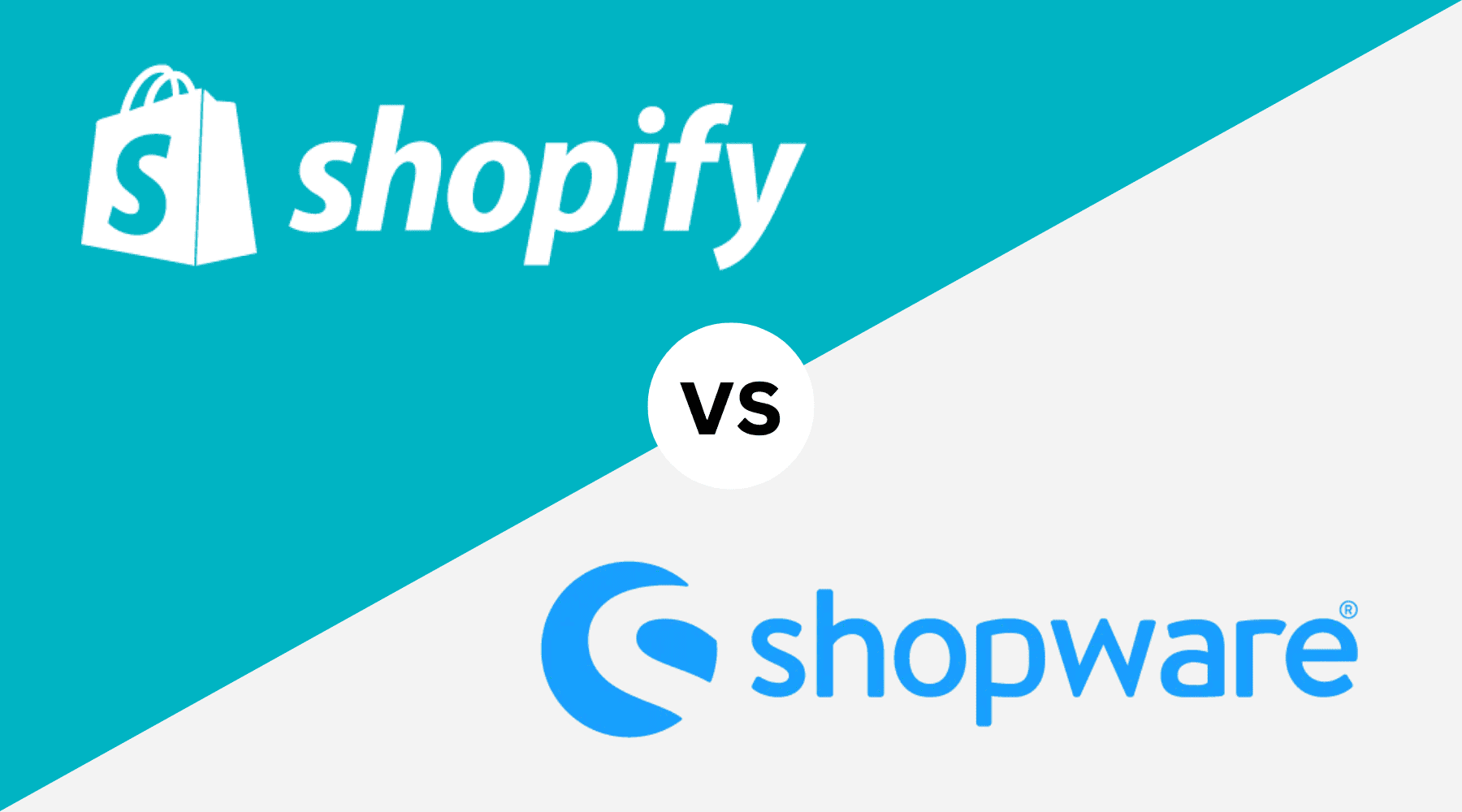The choice of your shop system is not a small technical detail, it’s a strategic lever.
It determines how flexibly you react to new requirements, how fast you scale, and how efficiently you manage your business. Especially in the DACH region, many merchants face a central question: Shopware or Shopify?
Both systems have their strengths, but neither is the perfect fit for every brand strategy. While Shopware convinces with its open architecture, Shopify offers a streamlined infrastructure built for global scalability. The key difference is which platform supports your vision technically and economically.
In this article, you’ll learn which solution fits your brand, which pitfalls to avoid, and how to turn your shop system into a growth engine.
Basics at a glance: What fundamentally sets Shopware & Shopify apart
Shopify and Shopware follow two completely different system philosophies. An objective shop system comparison helps you understand which platform fits your business best. You need to know how both systems work:
- Cloud vs. self-hosting: Shopify handles all technical tasks for you. Your shop runs fully in the cloud including updates, backups, and maintenance. You focus on selling, not infrastructure. Shopware traditionally relies on self-hosting. You install the software yourself or hire a provider. There is now a cloud version, but it is limited in features and far less common.
- Closed Source vs. Open Source: Shopify keeps its code closed. You work within the provided APIs and templates, enough for most use cases, but not for deep backend changes. Shopware is open source, allowing you to modify any part of the system if you have the technical skills or work with a specialized partner.
- Focus on B2C vs. B2B balance: Shopify was built for D2C brands that want to launch fast and scale quickly. The Plus plan now includes B2B features as well. Shopware comes from the B2B world and offers strong native B2B tools like custom price rules and role-based customer accounts. However, Shopify is catching up.
- Global solution vs. German-speaking market: Shopify is international by design, multilingual, multi-currency, and ready for cross-border commerce.
Shopware is tailored for merchants in Germany, Austria, and Switzerland, with a strong focus on legal compliance and customization.
5 technical hurdles that can cost you money and how Shopify solves them smarter
Technology should enable growth, not limit it.
These five hurdles often appear when working with Shopware:
- Update and maintenance effort: With Shopware, you are responsible for system maintenance. Security updates, version upgrades, and plugin compatibility become part of your daily work or cost you external resources. Shopify takes these tasks off your hands completely. The system updates itself automatically in the background, so you can focus on revenue.
- Performance during traffic spikes: Whether from a campaign or influencer marketing when thousands of visitors suddenly hit your shop, the system must scale. With Shopware, performance depends on your hosting setup. Without enough reserve resources, you lose revenue. Shopify automatically distributes load across a global server network.
- Limits in variants and scaling: Many merchants underestimate technical limits. Shopware reaches constraints faster when it comes to product variants and catalog structures, especially in D2C. Shopify offers a well-designed data model and allows individual scaling through APIs and app extensions.
- Complex hosting: Running your own server brings responsibility. Downtime, security gaps, or overloaded databases cause costs. Shopify removes this point entirely. You don't need hosting knowledge, infrastructure, or downtime protection.
- Headless myths vs. reality: Shopware promotes technical freedom through headless architecture. But many merchants don’t need a fully decoupled frontend and backend. Shopify supports headless concepts through Hydrogen and the Storefront API. Most functions are already available in the core system or through specialized apps.
If you’re looking for a powerful Shopware alternative that reduces complexity while remaining scalable, Shopify is the smarter path.

How to bring your shop to enterprise level
As your shop grows, you need a platform that doesn’t slow down your processes but accelerates them. This is exactly where the Plus plan comes in. You manage all international markets, sales channels, and target groups through one central system.
Pricing rules, content logic, and checkout flows can be configured individually and tailored directly to your business.
Especially when working with multiple storefronts, international requirements, and complex workflows, the platform shows how far you can grow with it.
You gain operational speed, automate manual tasks, and reach new markets without additional tools. These structural advantages allow you to scale much more efficiently than with traditional systems.
However, the technical foundation alone is not enough. The system unfolds its full strength only through intentional implementation. This is where an experienced team supports you with professional Shopify Plus consulting.
You don’t develop your shop based on assumptions. You develop it around clear scaling goals and an architecture that follows your revenue drivers.
Whether international rollout, ERP integrations, or custom checkouts, the key Shopify Plus advantages are not in the feature list, but in the ability to map your business model precisely. This helps you stand out from the competition without getting lost in technical complexity.
GDPR, data protection & server location: where you’re on the safe side
Data protection remains a sensitive topic, especially in European e-commerce. Anyone processing personal data carries responsibility. A legally compliant shop is mandatory but what does that mean technically?
The core requirements are GDPR-compliant data processing, a properly configured cookie banner, and transparent processes around consent, storage, and deletion. All of this can be implemented on both platforms. The key difference is how easily and reliably it can be done.
Shopware uses servers located in Germany, which addresses an important security concern. The data stays within the country, and the perceived loss of control is lower. For many companies especially when legal teams are involved this is a strong argument.
However, data protection doesn’t end with server location. Even with Shopware, you must ensure that all plugins, tracking tools, and integrations are properly configured.
Shopify, on the other hand, operates with a global server network. Data processing follows standardized procedures, supported by mechanisms such as automatic encryption and role-based access controls.
The provider supplies legally compliant documentation that you can use directly for your information requirements. With the right apps, you can adapt cookie banners, consent flows, and privacy notices without needing your own development resources.
In the end, what matters is not only where your data is stored, but how stable, transparent, and predictable your setup is. Data protection is an ongoing process. You need a system that meets legal requirements while still giving you full control and flexibility.
Avoiding mistakes: common thinking errors merchants make when choosing a platform
Many decisions around e-commerce shop systems are based on assumptions rather than processes. This leads to avoidable costs and technical bottlenecks.
These thinking errors occur especially often:
- Overvaluing features: Many merchants compare feature lists instead of asking which processes actually matter in daily operations. It’s pointless if a system offers ten tools but you use none of them. What counts is how efficiently it supports your real workflows.
- Idealizing open source: The freedom to change everything sounds appealing. In reality, every extension requires time, budget, and technical expertise. Choosing open source without securing these resources is risky.
- Using apps without a strategy: Apps solve specific problems, but without structure, they create a patchwork. Without an app strategy, you lose oversight, speed, and long-term security. With Shopify, it’s not about the number of apps, but how well they integrate.
- Underestimating migration: Switching systems is more than importing data. Product structures, customer accounts, SEO setups, and design logic must be rebuilt. Underestimating this leads to lost time, visibility, and trust.
- Ignoring maintenance costs: Every system requires ongoing maintenance. With self-hosted solutions, hosting, updates, security checks, and technical support add up. If these costs aren’t planned, you end up paying later through downtime and delays.
A solid setup doesn’t come from ticking feature boxes it comes from clear goals, the right tools, and realistic resource planning.

Shopify vs. Shopware: Which system is worth it for you?
When you work with a shop system, the goal is efficiency. You need a solution that fits your processes not one that keeps you stuck in maintenance and complexity.
Shopify is worth it if you want to set up your business quickly, optimize continuously, and scale without technical overhead. Entry costs begin at €36 per month. Hosting, security, and updates are included. You only pay for the features you actually use. This keeps you flexible both technically and financially.
The other platform becomes interesting if you have a dedicated development team and need full control over all system components. Pricing starts at €600 per month. On top of that come hosting, maintenance, and custom development. Without internal expertise or an e-commerce agency, costs rise quickly especially long-term.
For modern brand management, you don’t need a system that can theoretically do everything. You need a setup that doesn’t slow you down. If you work in B2C, think internationally, or need to react quickly to market changes, Shopify has a clear advantage.
If you operate in B2B and actively manage technical complexity, Shopware can be a good fit under the right conditions. Both systems have their place. What matters is not what they promise but how much effort you need to invest to unlock their potential.
How Datora supports you: custom Shopify solutions
Standard solutions are not enough and that’s exactly where our work begins. Datora builds Shopify stores that go far beyond basic template setups. You get a technical foundation that doesn’t limit you, but gives you room to grow.
If you currently work with Shopware and are considering switching, we guide you through the entire migration to Shopify. We take care of data import, rebuild your product logic, apply your design, and integrate all relevant processes into the new system.
If you need features that don’t exist in the App Store, we develop extensions tailored to your business model from complex product configurators to custom checkout logic. You get solutions that directly support your requirements.
As a specialized Shopify Plus agency, we know the platform’s strengths and limitations in detail. We don’t build randomly we implement precisely what moves your brand forward. Whether enterprise features, international setups, or API integrations, you receive a system built for performance.
Quick comparison: Shopware vs Shopify at a glance
Want to make a fast decision?
This overview shows the most important differences between the two platforms at a glance:
|
Criteria |
Shopify |
Shopware |
|
Hosting |
Cloud-only, maintenance-free |
Self-hosted or Shopware Cloud |
|
Entry costs |
from 36 €/month |
from 600 €/month (Rise) |
|
Adaptability |
Via app & API, limited in checkout |
Complete (Open Source) |
|
Scaling |
Seamless tariff change |
Version & hosting dependent |
|
Data protection |
GDPR compliant, servers outside the EU |
GDPR compliant, server in Germany possible |
|
App ecosystem |
8,000+ apps |
approx. 3,000 plug-ins |
|
B2B functions |
Included in the Plus Plan |
Strongly integrated into the core |
|
Design flexibility |
Theme Editor, storytelling capable |
CMS with higher effort |
|
internationalization |
Multi-language, multi-currency |
Focus on DACH |
|
Support |
24/7 support |
Limited, depending on the license |

Conclusion: Which system truly helps you grow
Choose the shop system that accelerates your processes not the one that only looks good on paper. Technical excellence is not about the number of features, but about how well the system supports your strategy.
Shopify gives you a clear structure, fast scalability, and full control over your operational workflows. If you want to sell internationally, develop your brand flexibly, and avoid technical barriers, you’ll find the more robust setup here.
The other platform can work well in specific B2B scenarios, but only if you have the internal resources to handle the technical complexity.
In the end, it’s not the system that determines your success it’s your setup. And your setup should help you grow.








